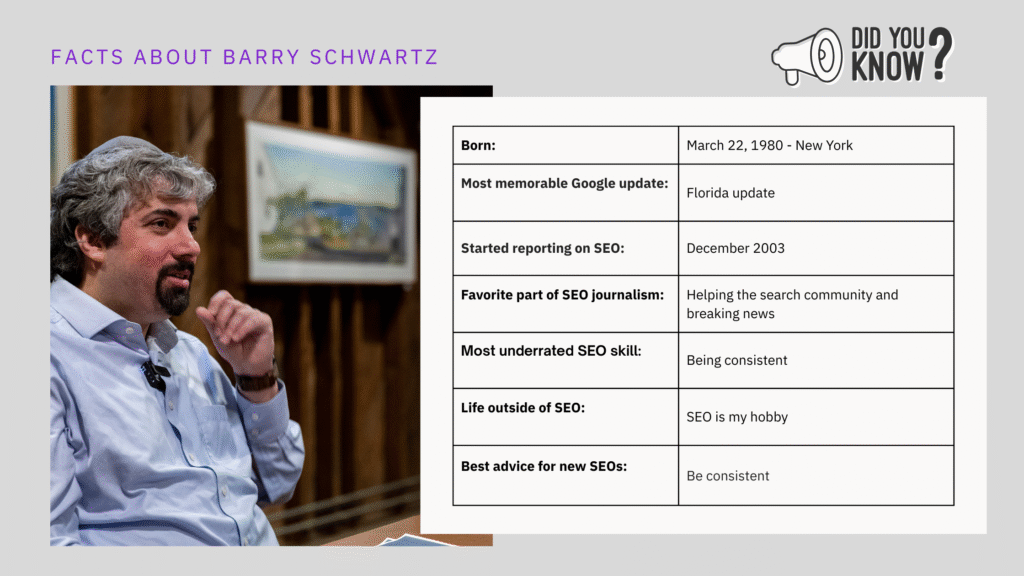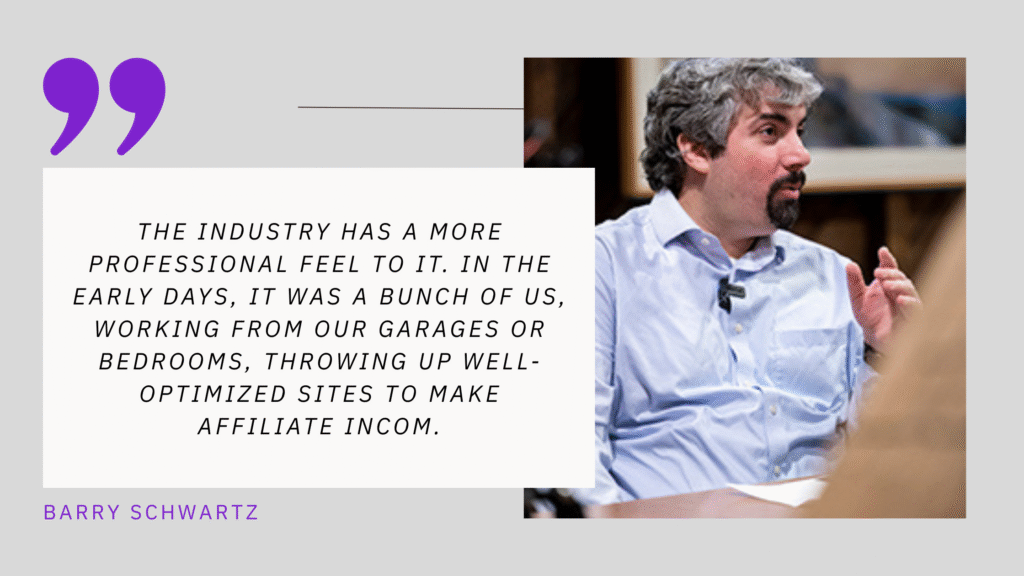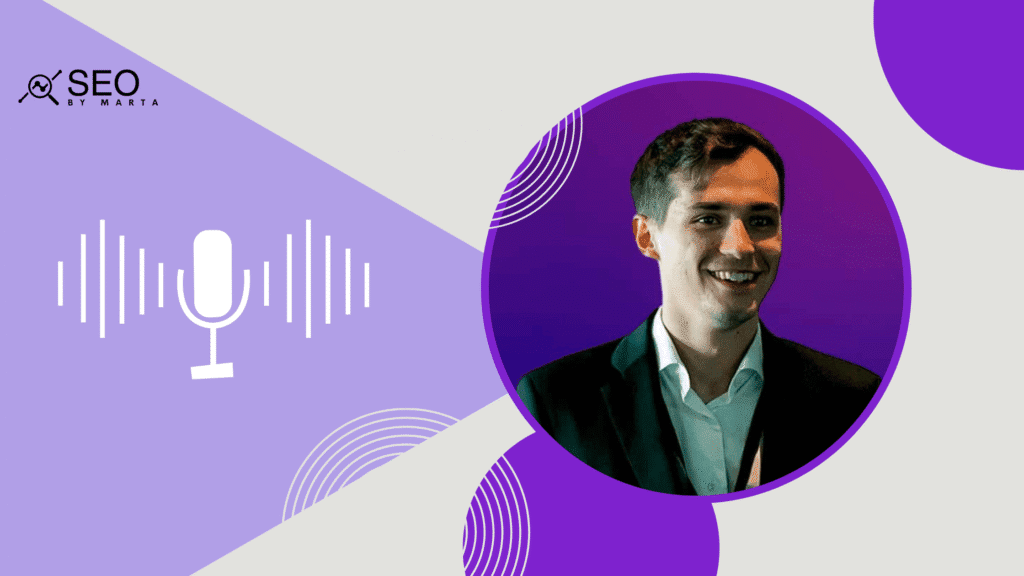About Barry Schwartz
Barry Schwartz stands as one of the most trusted and influential voices in the SEO industry. He is the founder and editor of Search Engine Roundtable and a long-time contributing editor at Search Engine Land. Since 2003, Barry has been documenting nearly every major Google algorithm update, policy change, and industry development, making his reporting an indispensable resource for SEO professionals worldwide.
Known for his speed, accuracy, and unwavering dedication to the community, Barry’s reporting has become the definitive resource for search professionals worldwide. His passion for search extends beyond journalism—Barry is also the CEO of RustyBrick, an innovative web development firm, a conference speaker, podcast host, and trusted advisor to search platforms and marketers worldwide.

Interview – From 2003 to 2025: Two Decades of SEO News
Barry Schwartz has been writing about SEO for longer than most people have even been in the industry. Since the early 2000s, he’s been the person SEOs turn to when Google rolls out an update, drops a hint, or keeps everyone guessing. Through his work, Barry has chronicled the highs, lows, and constant changes in search for more than twenty years. In this conversation, he reflects on two decades of covering SEO news, how the role of reporting has changed over time, and the challenges that come with keeping pace in such a fast-moving industry.
Q: Hi Barry, thank you for agreeing to this expert interview. You’ve been covering SEO since 2003. Looking back, what were the earliest days of SEO news like, and how has the landscape changed since then?
A: The industry has a more professional feel to it. In the early days, it was a bunch of us, working from our garages or bedrooms, throwing up well-optimized sites to make affiliate income. Now, we have SEO departments in major businesses, we have VP of SEOs, we have seminars. The whole space is just much more professional and respected than it was two decades ago.
Q: Google’s communication style has often been described as vague or limited. How has reporting on Google’s updates evolved in response to that, and what challenges does it still create?
A: In the early years, Google never confirmed any updates. In fact, we use to sit and watch Google’s data centers update in real time, every 30 days or so by checking various Google IP addresses and watching the rankings change between those data centers. Google would only update rankings monthly. Now, Google’s rankings are updated in real time.
That being said, soon enough, Matt Cutts from Google came out and started to talk about these changes. He would discuss various updates, generally after they happened but sometimes before. Heck, once Google even gave us a sandbox URL to test a big infrastructure update, to see if the results were any good.
Then we had the good old Panda and Penguin updates where Google would not only confirm the updates, but also tell us how impactful they were. Google would say if the update impacted 3% or 11% etc of the search results. Then Google went quiet a bit on these updates, some called them Phantom update. That was until Google started to confirm core updates, spam update and other various updates again.
Now, Google confirms only the big updates but many of the other updates do not get any confirmation from Google. We see them, we see the rankings changing in a big way but nothing is announced on Google’s end.
It is nice to have Google confirm updates, because then you know for a fact it was something Google changed on its end. But even if they don’t, as long as I document the unconfirmed updates, you know many others are experiencing the same at the same time, and that can be comforting and useful to know.

Q: Why do you think documenting even the smallest search engine tweaks and community reactions still matters, and what have you learned from tracking granular changes year after year?
A: Documenting these changes can be useful when trying to understand why a site’s traffic from Google Search went up or down. Sometimes it can be related to a Google ranking update. Sometimes it can be related to a feature change (i.e. featured snippets, AI Overviews, sports answers, people also ask, etc). And sometimes it can be related to a user interface change.
So documenting these changes can give one a reference point to look at when it comes to traffic changes with Google Search.
Q: What core skills do you believe are essential for someone who wants to start a successful SEO News blog today, and how have these requirements shifted compared to when you first began reporting on search?
A: Consistency is key. You need to be on every day, publish the type of content your readers expect and when they expect it. I think the most important skill is consistency when it comes to building an SEO blog. Of course, my style has improved over the years. The images are better, the content is better, but that happens over time. The more you do something, generally the better you get at it.
Q: You’re known for balancing speed with accuracy in reporting. What’s your process for ensuring reliability while still being one of the first to publish on breaking updates?
A: Having experience helps. Do I get things wrong? Sure, sometimes. And if I do, I update the story with the correction. We are all humans.
Q: What advice would you give to SEO professionals on staying credible and trustworthy when covering complex, rapidly changing topics like algorithm updates and AI-driven search trends?
A: For me, it helped that I do not sell SEO services. I can’t let the income I would be making influence what I write or how I write it. I don’t have biases and influences that many other SEO writers have because I don’t make money selling SEO consulting services. I will always say what I believe to be the truth and I think that is why I have been able to keep a pretty good reputation over the years.
Conclusion
Talking to Barry Schwartz is like getting a front-row seat to the history of SEO. He’s been there since the early days, watching every update, every shift in strategy, and every rumor that set the industry buzzing. Over the past twenty years, the tools, platforms, and challenges have changed, but what hasn’t changed is Barry’s commitment to keeping the SEO community informed and grounded.
As the search landscape heads into a new chapter shaped by AI and constant change, Barry’s perspective is a reminder of why trusted voices matter. Two decades on, he’s still asking the right questions — and helping the rest of us find the answers.




